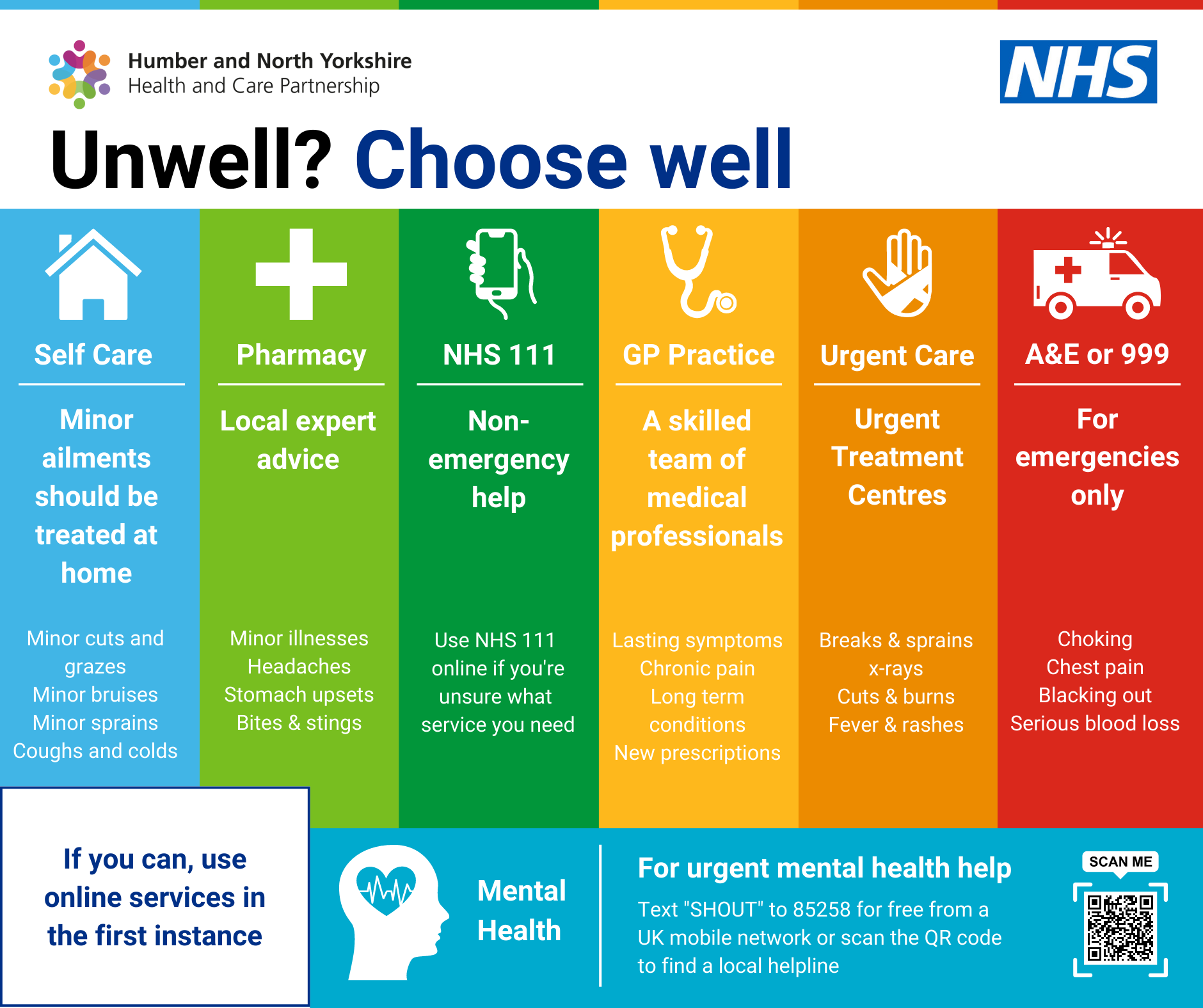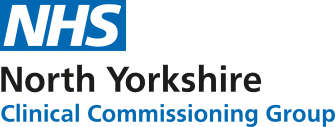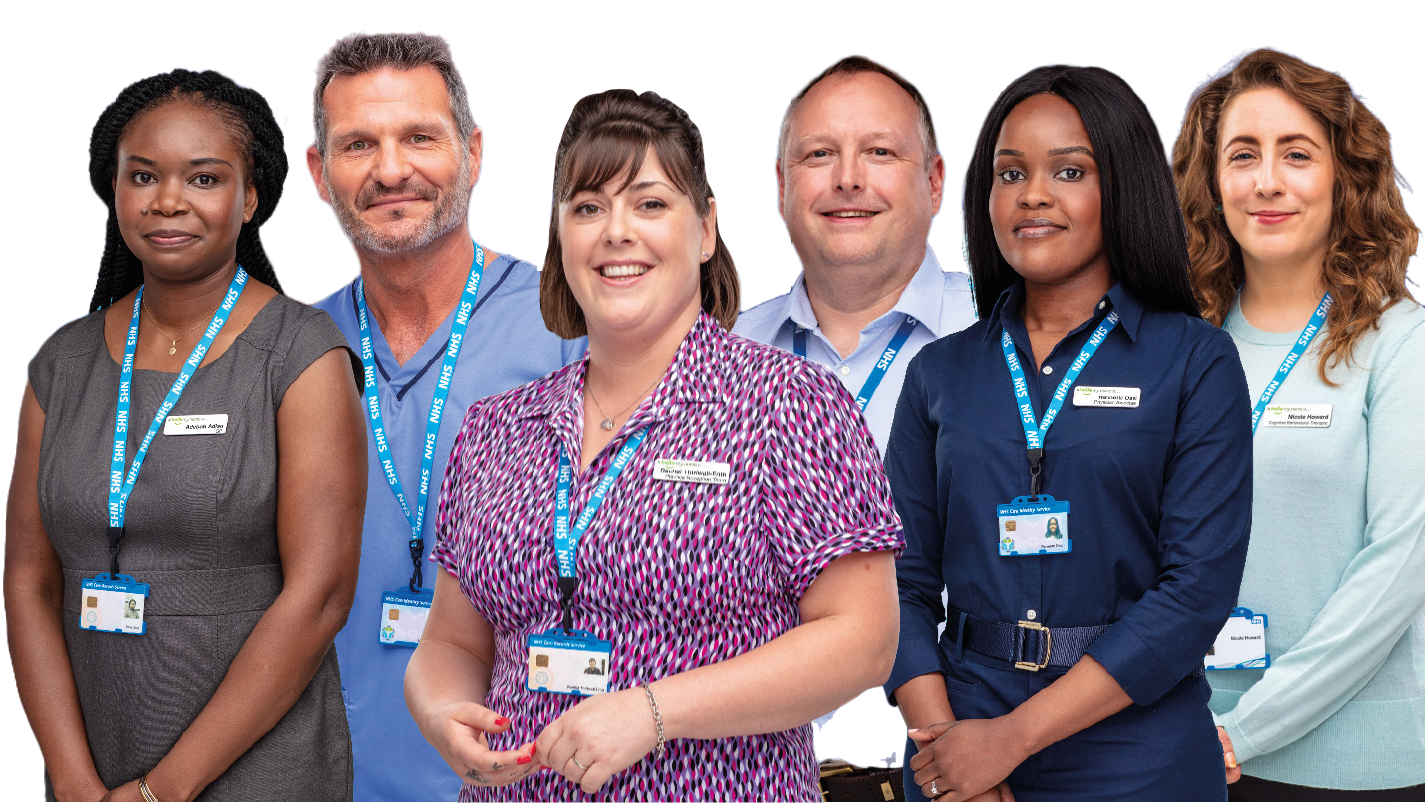Choosing the right healthcare option

We know that finding the right place to go when you become ill or are injured can sometimes be confusing. By selecting the right service for your illness or injury, you're not only looking after your health but using your NHS services responsibly and in a way that helps hardworking staff to treat and care for patients appropriately.
Self-care is the best choice to treat minor illnesses and injuries. A large range of common illnesses and injuries can be treated at home simply with over-the-counter medicines and plenty of rest.
What is self-care?
Self-care means looking after yourself in a healthy way, whether it’s eating healthily, taking medicine when you have a cold, or doing some exercise.
How can I self-care?
Self-care includes the actions you take every day in order to stay fit and maintain good physical and mental health, meet your social and psychological needs, prevent and treat illness, and care more effectively for minor ailments.
Can anyone help me to self-care?
Your pharmacist can help you to stock up your medicine cabinet with remedies for minor ailments and illnesses. Some useful additions to your home first-aid kit include:
- Paracetamol and aspirin, and equivalent syrups (such as Calpol) for children
- Mild laxatives to relieve constipation
- Rehydration mixtures for diarrhoea or vomiting
- Indigestion remedy
- Travel sickness tablets
- Tweezers and sharp scissors to remove splinters or cut bandages
- A thermometer to check for fever
- A range of bandages, plasters, non-absorbent cotton wool, elastic bandages and dressings for minor cuts, sprains and bruises
Why should I self-care?
Keeping yourself fit and healthy can help you boost your immunity to illnesses like colds, flu and infections. Making big lifestyle changes like quitting smoking or losing weight can also decrease your chances of getting a serious illness like cancer or heart disease.
There's more information about self-care for minor ailments, here.
Pharmacy teams play a key role in providing quality healthcare to patients. Working in the community and hospitals, pharmacy teams use their clinical expertise together with their practical knowledge to ensure the safe supply and use of medicines by patients and members of the public.
What services are offered by pharmacists?
They offer advice on common problems such as coughs, colds, aches and pains, as well as healthy eating and stopping smoking. They can also help you decide whether you need to see a doctor.
You can talk to your pharmacy team in confidence, even about the most personal symptoms and you don't need to make an appointment. It is possible to walk into any community pharmacy and ask to speak with a member of the team. They may be able to spend some time with you. Most pharmacies now have a private consultation area where patients can discuss issues with pharmacy staff without being overheard by other members of the public.
Pharmacy teams dispense your prescriptions and other medicines, may offer testing and screening for common conditions and can advise on minor ailments. You may be able to get medicine from a pharmacy in an emergency, subject to certain conditions. Supplying emergency medicine is a private service, not funded by the NHS. This means your pharmacy can charge for it. The charge will vary depending on the medicine and the pharmacy policy - speak with your pharmacist.
The services that may be available from your local pharmacy are:
- Emergency contraception
- Vaccination advice
- Truss fittings
- Incontinence supplies
- Needle exchange and supervised drug administration
- Pregnancy testing
- Stop smoking services
- Medicines Use Reviews
- New Medicine Service
- Chlamydia screening and treatment
- Weight management
Minor ailments include:
- Viruses
- Minor injuries
- Tummy troubles
- Women's health
- Skin conditions
- Allergies
- Aches and pains
- Children's problems
What If I Need To See A Pharmacist Out Of Hours?
Certain pharmacies open voluntarily outside of normal working hours.
There's more information about pharmacies, here and here.
You can also watch an animation, here.
If you're unwell (and it's not life-threatening), but you're unsure of where to get the best help, dial 111 or visit NHS 111 online.
If you have an illness or injury that just will not go away, make an appointment with your local GP practice. They provide a range of services by appointment, including medical advice, examinations and prescriptions. GP surgeries offer urgent appointments, and some practices offer an evening and weekend service.
What do they offer?
Your local doctors’ surgery or GP practice provides a wide range of family health services, including:
- advice on health problems
- vaccinations
- examinations and treatment
- prescriptions for medicines
- referrals to other health services and social services
Once you’ve made an appointment with your GP practice it is important to keep it,or notify the surgery if you have to cancel or change it.
What can I expect from my doctors' surgery
Doctors and other healthcare professionals working in general practice can give health education and advice on things like smoking and diet, run clinics, give vaccinations and carry out simple surgical operations.
Doctors usually work with a team including nurses, health visitors and midwives, as well as a range of other health professionals such as physiotherapists and occupational therapists. If doctors cannot deal with your problem themselves, they’ll usually refer you to a hospital for tests, treatment or to see a consultant with specialised knowledge.
GP Out-of-hours services
If you require urgent but not emergency medical care when your GP surgery is closed you should telephone NHS 111 who will direct you to the GP Out of Hours Service.
For information about registering with a GP practice, click here.
You should go to an urgent treatment centre or minor injuries unit if you need urgent medical attention, but it's not a life-threatening situation.
If you call NHS 111 first, you maybe given an appointment slot.
Minor injury units and urgent treatment centres are for less serious injuries, such as deep cuts, eye injury, severe sprains, minor head injury, minor burns and scalds and less serious broken bones.
Many people go to Accident and Emergency when they could be treated just as well and probably quicker at a minor injury unit or urgent treatment centre. In Accident and Emergency staff must give priority to serious and life-threatening conditions, so if you go there with a minor injury you may have to wait longer to be seen. It is better to go to a minor injury unit or urgent treatment centre where they can see and treat.
- Less serious fractures
- sprains
- strains
- cuts
- bruises
- minor burns
Children over the age of 18 months can also be treated at a minor injury unit / urgent treatment centre.
You can find out more, here.
A&E or 999 are for emergency or life-threatening situations.
Examples of emergency situations are:
- Severe chest pains
- Breathing difficulties
- Heavy bleeding
- Loss of consciousness
- Serious head injury
- Severe burn/scald
- Severe allergic reaction
- Suspected broken bones or dislocation
- Severe stomach ache that cannot be treated by over-the-counter remedies
- Deep wounds
- Overdose or poisoning
There's more information about 999, here.


